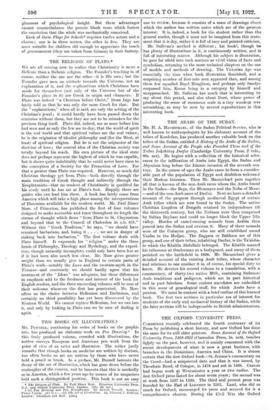THE RELIGION OF PLATO.* WE are all coming now to
realize that Christianity is more a Hellenic than a Hebraic religion. The- Founder's teaching is, of course, neither the one nor the other—it is His own ; but the Founder gave men an attitude towards the Universe, not an explanation of it, and the explanations which Christians have made for themselves (not only of the Universe but of the Founder's place in it) are Greek in origin and character. If Plato was indeed " a Christian before Christ," Dean Inge has lately told us that he was only the more Greek for that. But the " explanations," when all is said, are only the setting of the Christian's jewel ; it could hardly have been passed down the centuries without them, but they are not to be mistaken for the precious thing itself. Plato did, indeed, see as none before him had seen and as only the few see to-day, that the world of spirit is the real world and that spiritual values are the real values ; he is the originator of idealist philosophy and (for the West, at least) of spiritual religion. But he is not the originator of the doctrine of love ; the central idea of the Christian society was totally beyond his reach. His own picture of the ideal state does not perhaps represent the highest of which he was capable, but it shows quite indubitably that he could never have risen to the conception of a Society for the Promotion of Love. For that a greater than Plato was required. However, so much did Christian theology get from Plato—both directly through the main tradition of Greek thought and indirectly through the Neoplatonists—that no student of Christianity is qualified for his study until he has sat at Plato's feet. Happily them are guides who can lead him there. A book has lately come from America which will take a high place among the interpretations of Platonism available for the modern world. Mr. Paul Elmer More, of Princeton, has published the first of four volumes designed to make accessible and trace throughout its length the stream of thought which flows " from Plato to St. Chrysostom and beyond that to the Council of Chalcedon in A.D. 451." Without this " Greek Tradition," he says, " we should have remained barbarians, and, losing it . . . we are in danger of sinking back into barbarism." The first volume deals with Plato himself. It expounds his " religion " under the three heads of Philosophy, Theology and Mythology, and the exposi- tion, though naturally incomplete, could only have been less so if it had been also much less clear. Mr. More gives greater weight than we usually give in England to certain parts of Plato's work—notably the Laws and the creation-myth in the Timams—and conversely we should hardly agree that his treatment of the " Ideas " was adequate, but these differences in emphasis add to the freshness and interest of the book for English readers, and the three succeeding volumes will be sure of their welcome wherever the first has penetrated. Mr. More offers us the choice between Hellenism and Barbarism, and certainly no third possibility has yet been discovered by the Western World. We cannot replace Hellenism, but we can lose it. and only by looking in Plato can we be sure of finding it again.


































 Previous page
Previous page